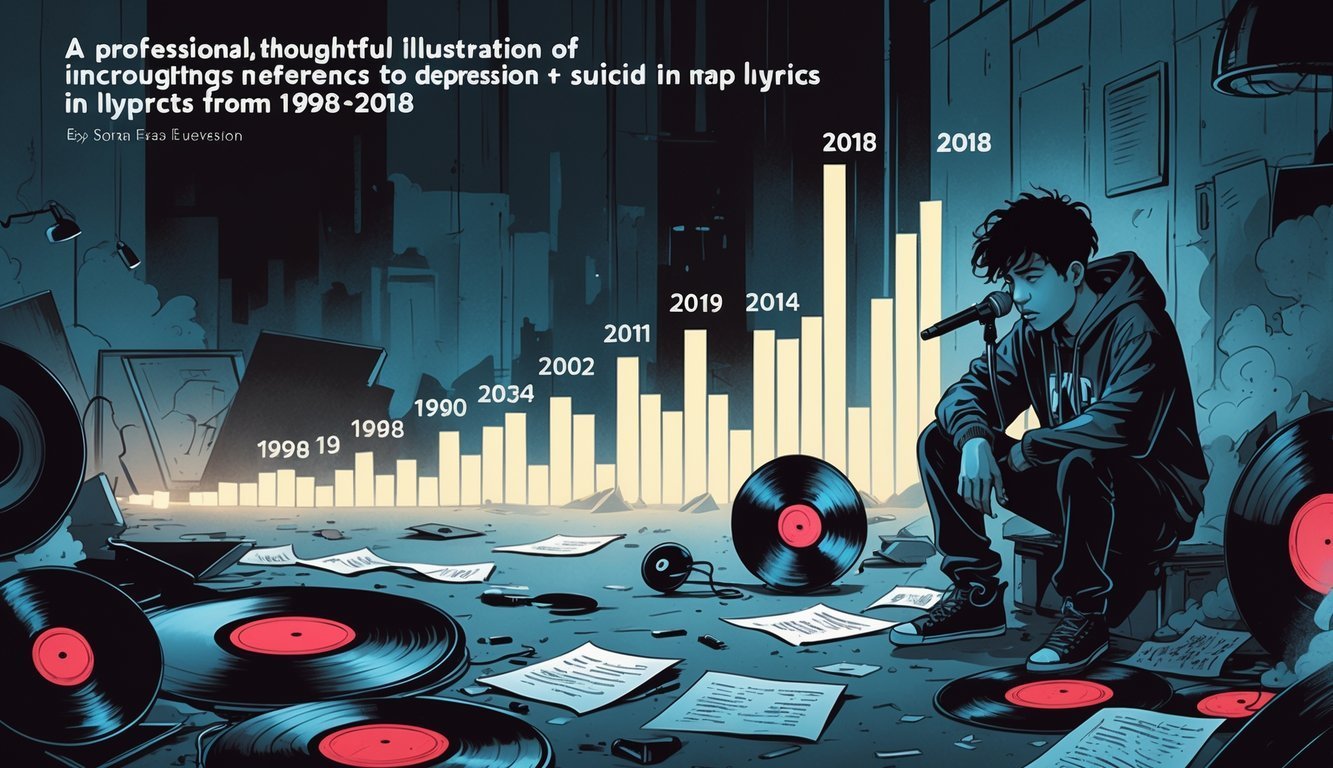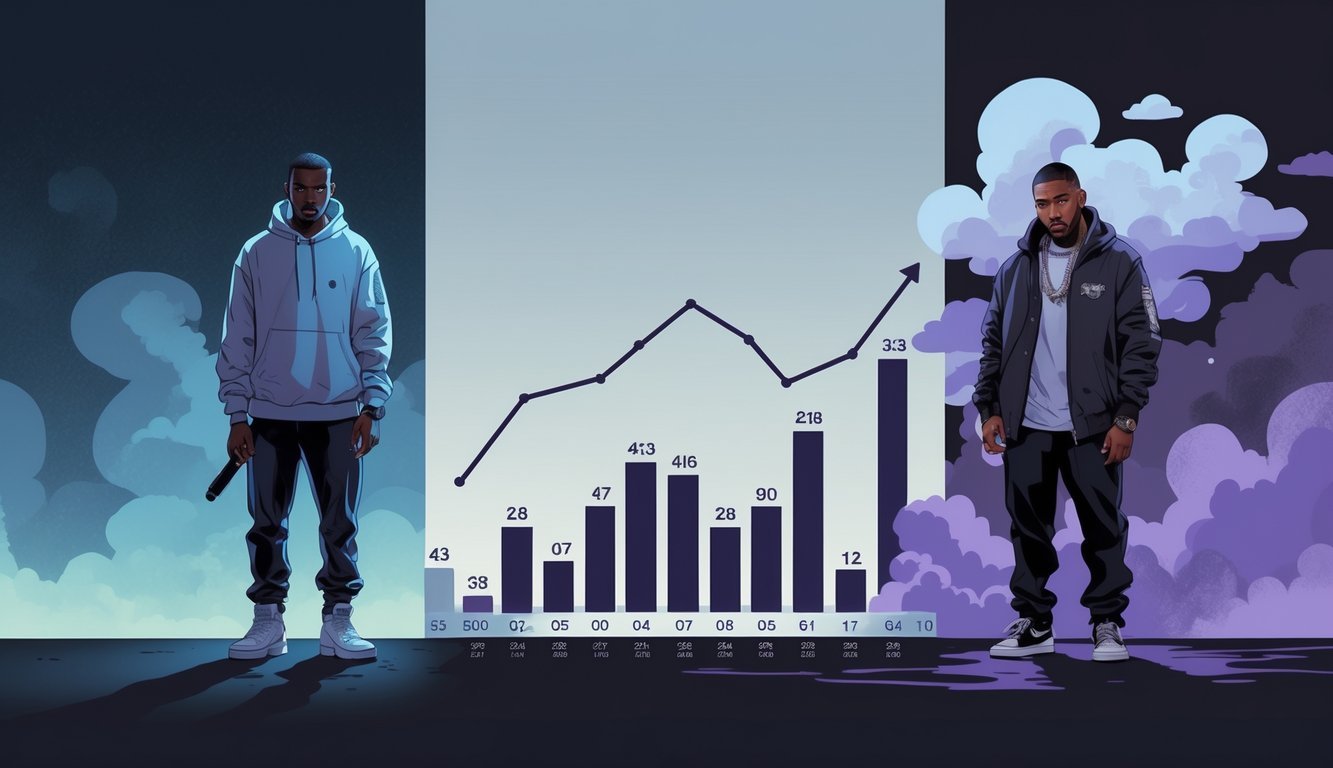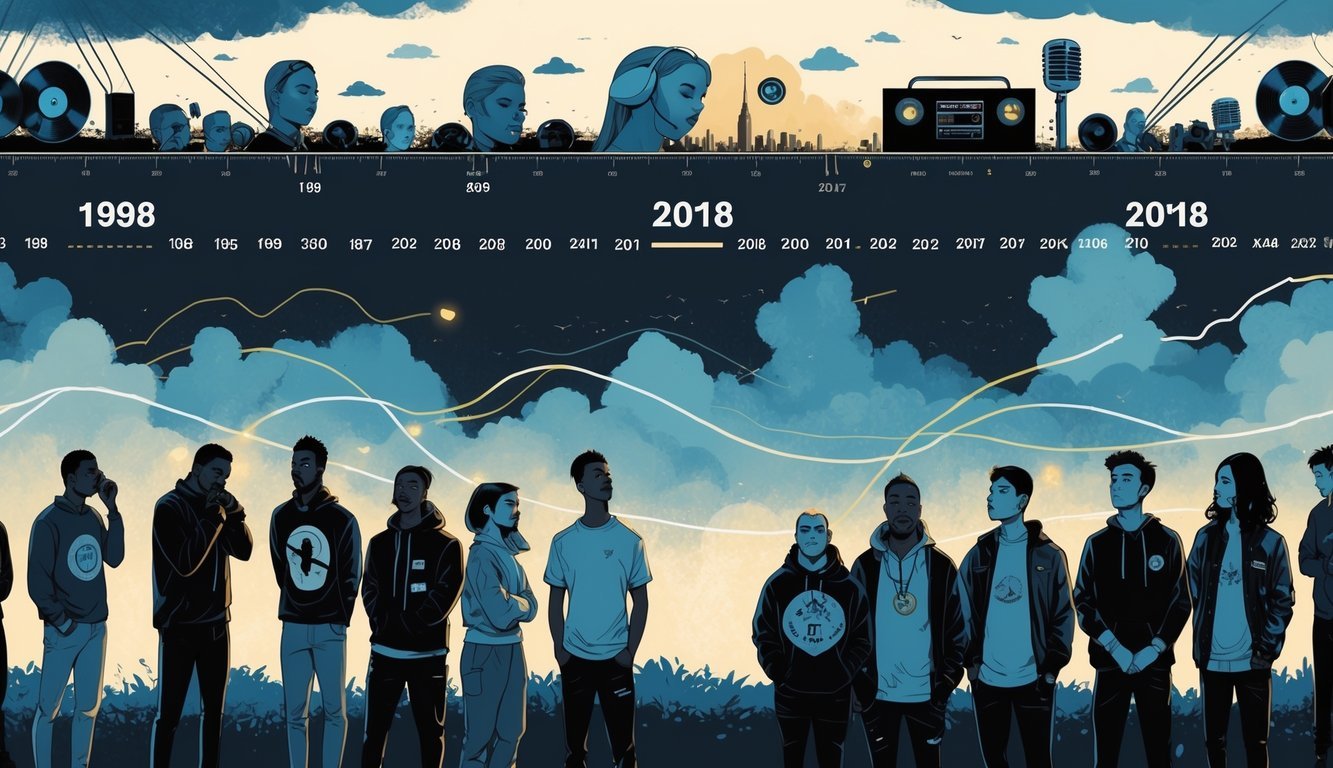PsychNewsDaily Publishers
100 Summit Drive
Burlington, MA, 01803
Telephone: (320) 349-2484
PsychNewsDaily Publishers
100 Summit Drive
Burlington, MA, 01803
Telephone: (320) 349-2484
Rap music increasingly addresses mental health, with significant mentions of depression and suicide rising from 16% in 1998 to 32% in 2018, reflecting societal changes.

Between 1998 and 2018, rap artists started talking about mental health in their music way more than before. References to depression and suicide in rap lyrics shot up during this period.
This shift shows artists getting more real about mental health struggles, which brings these tough topics out into the open.
A lot of popular rap songs now mention anxiety, depression, or suicide, showing a stronger connection to real-life problems. This shift helps listeners feel seen and less alone.
Music and culture together can help break down stigma around mental health. The lyrics don’t just stick to beats and rhymes anymore—they actually share stories that hit home for plenty of people.
You’ll notice rap music growing into a space for honest conversations about feelings. That’s a big deal.

Rap music started talking about depression and suicide much more from 1998 to 2018. Artists brought more honest conversations about mental health into their songs.
You can spot this shift in the numbers, the lyrics, and the way listeners react.
Back in 1998, about 16% of rap songs mentioned depression. By 2018, that number jumped to 32%.
Mentions of suicide went from almost nothing to 12%. By 2018, roughly 68% of the most popular rap songs sent some kind of mental health message.
Mental health topics like anxiety and psychological stress started showing up more often. The music industry is clearly paying more attention to these issues.
Artists like Kendrick Lamar talk about depression and anxiety in their music, opening up about their own struggles. Kanye West has shared his mental health challenges too, which changes how fans see these topics.
Jay-Z brings up loss and emotional pain, mixing his personal life with bigger social issues. These artists turn rap into a space for honest talk about tough emotions.
Their openness encourages listeners, especially younger ones, to face their own feelings.
More rap songs now use metaphors and direct lines about feeling lost, trapped, or hopeless. Lyrics about depression and suicide stand out more than they used to.
Songs often describe emotions tied to loss, anxiety, or long-term stress. This honesty helps listeners recognize feelings they might have a hard time naming.
Hip-hop works as both art and therapy, letting rappers share their mental health journeys. It also gets more people talking about these topics in everyday life.
Mental health themes in rap music really reach young people and Black teenagers. These groups face unique pressures and sometimes feel alone with their struggles.
JAMA Pediatrics and other studies say that talking about suicide in music can raise awareness, but there’s some risk too. Still, a lot of fans feel less alone when artists share these feelings.
Rap’s openness helps reduce stigma and might even push listeners to get help. The music industry’s focus on mental health can shape how young fans deal with their emotions.

Rap music keeps reflecting and shaping society by talking more about depression and suicide. This shift changes attitudes, impacts the music business, and even catches the attention of mental health researchers.
Rap has always let artists share their struggles, but for a long time, mental health topics like depression and suicide stayed hidden or felt off-limits. By the late 2010s, rappers started using metaphors and direct language that challenge old ideas about therapy and medication.
You might notice artists describing their battles with anxiety or trauma in ways that feel more honest now. This shift helps listeners feel less isolated.
It also nudges the music industry to support songs that talk openly about these issues.
Digital media spreads mental health messages in rap faster than ever. Social platforms let artists connect with fans right away, making mental health talk part of daily entertainment.
Music videos and pop art use symbols tied to mental health all the time. You’ll see creativity and awareness mixing—Instagram captions, TikTok clips, and more.
This visibility helps normalize mental health struggles and sparks hope for healing, especially for young fans facing tough stuff like gun violence.
Researchers at places like the University of North Carolina and JAMA Pediatrics have noticed rap music’s growing focus on mental health. They’ve shown that from 1998 to 2018, popular songs referencing depression and suicide more than doubled.
Their work helps you see how hip-hop mirrors social and cultural changes. It also pushes the music industry to treat mental health as something serious, not just another trendy topic.
These insights give mental health professionals new ways to reach younger audiences through music.

Rap lyrics now talk about depression and suicide way more than they used to. If you listen closely, you’ll notice how this change might affect your own views on mental health.
Rap lyrics mentioning depression and suicide can make you more aware of these issues. They show emotions and struggles in a way that feels real.
Yes, hearing rap songs that talk about depression or suicide can shift how teens see these topics. It might help them accept that mental health problems are real and nothing to hide.
From 1998 to 2018, mentions of mental health in rap more than doubled. Early rap rarely brought up these issues, but now plenty of songs dig into depression, suicide, and emotional struggles.
There isn’t a direct, proven link between listening to rap and mental health outcomes. Still, songs that talk about mental health might encourage you or someone else to seek help or open up about feelings.
Rap music brings mental health into the conversation. It makes these topics less taboo and encourages more openness, especially in communities where mental health hasn’t always been discussed.
Absolutely. When rappers talk about tough subjects, like depression, it chips away at the stigma.
You realize you’re not the only one feeling this way. Sometimes, just hearing someone else say it out loud can spark a bit of hope or help you feel connected.